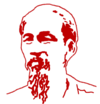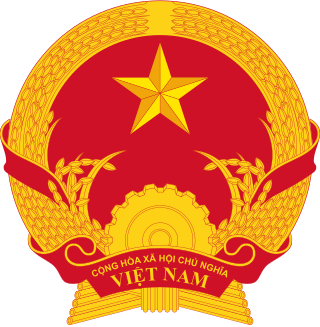
The politics of Vietnam is dominated by a single party, the Communist Party of Vietnam (CPV). The President of Vietnam is the head of state, and the Prime Minister of Vietnam is the head of government, both of these are separate from the General Secretary of the Communist Party of Vietnam who leads the Communist Party and is head of the Politburo and the Central Military Commission, thus the General Secretary is the de facto supreme leader of Vietnam. Executive power is exercised by the government and the President of Vietnam. Legislative power is vested in the National Assembly of Vietnam. The Judiciary is independent of the executive. The parliament adopted the current Constitution of Vietnam, its fifth, on 28 November 2013.

Hồ Chí Minh, commonly known as Bác Hồ, Hồ Chủ tịch and by other aliases and sobriquets, was a Vietnamese revolutionary and statesman. He served as Prime Minister of Vietnam from 1945 to 1955, and as President of Vietnam from 1945 until his death in 1969. Ideologically a Marxist–Leninist, he was the Chairman and First Secretary of the Workers' Party of Vietnam.

The Viet Cong, officially the National Liberation Front of South Vietnam, was an armed communist organization in South Vietnam, Laos and Cambodia. It fought under the direction of North Vietnam against the South Vietnamese and United States governments during the Vietnam War. It had both guerrilla and regular army units, as well as a network of cadres who organized and mobilized peasants in the territory the Viet Cong controlled. During the war, communist fighters and anti-war activists claimed that the Viet Cong was an insurgency indigenous to the South, while the U.S. and South Vietnamese governments portrayed the group as a tool of North Vietnam. According to Trần Văn Trà, the Viet Cong's top commander, and the post-war Vietnamese government's official history, the Viet Cong followed orders from Hanoi and were part of the People's Army of Vietnam, or North Vietnamese army.
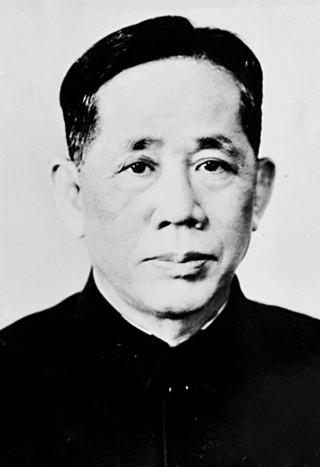
Lê Duẩn was a Vietnamese communist politician. He rose in the party hierarchy in the late 1950s and became General Secretary of the Central Committee of the Communist Party of Vietnam (VCP) at the 3rd National Congress in 1960. He continued Hồ Chí Minh's policy of ruling through collective leadership. From the mid-1960s until his own death in 1986, he was the top decision-maker in Vietnam.

Phạm Văn Đồng was a Vietnamese politician who served as Prime Minister of North Vietnam from 1955 to 1976. He later served as Prime Minister of Vietnam following reunification of North and South Vietnam from 1976 until he retired in 1987 under the rule of Lê Duẩn and Nguyễn Văn Linh. He was considered one of Hồ Chí Minh's closest lieutenants.

The Communist Party of Vietnam (CPV), also known as the Vietnamese Communist Party (VCP), is the founding and sole legal party of the Socialist Republic of Vietnam. Founded in 1930 by Hồ Chí Minh, the CPV became the ruling party of North Vietnam in 1954 and then all of Vietnam after the collapse of the South Vietnamese government following the Fall of Saigon in 1975. Although it nominally exists alongside the Vietnamese Fatherland Front, it maintains a unitary government and has centralized control over the state, military, and media. The supremacy of the CPV is guaranteed by Article 4 of the national constitution. The Vietnamese public generally refer to the CPV as simply "the Party" or "our Party".

Trường Chinh was a Vietnamese communist political leader and theoretician. He was one of the key figures of Vietnamese politics. He played a major role in the anti-French colonialism movement and finally after decades of protracted war in Vietnam, the Vietnamese defeated the colonial power. He was the think-tank of the Communist Party who determined the direction of the communist movement, particularly in the anti-French colonialism movement. After the declaration of independence in September 1945, Trường Chinh played an important role in shaping the politics of the Democratic Republic of Vietnam (DRV) and creating the socialist structure of the new Vietnam.

The Constitution of the Socialist Republic of Vietnam is the current constitution of Vietnam, adopted on 28 November 2013 by the Thirteenth National Assembly, and took effect on 1 January 2014. It is the fourth constitution adopted by the Vietnamese government since the political reunification of the country in 1976.
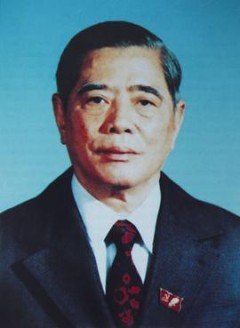
Nguyễn Văn Linh was a Vietnamese revolutionary and politician. Nguyễn Văn Linh was the general secretary of the Communist Party of Vietnam from 1986 to 1991 and a political leader of the Vietcong during the Vietnam War. During his time in office, Linh was a strong advocate of "Đổi Mới" (renovation), an economic plan whose aim is to turn Vietnam economy to a socialist-oriented market economy. As such, Linh was often touted as the "Vietnamese Gorbachev" after the Soviet leader, who introduced Perestroika.
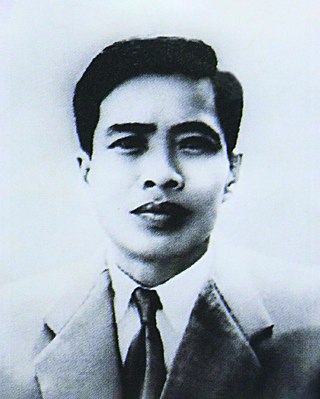
Phạm Hùng was a Vietnamese politician and the 2nd Prime Minister of the Government of the Socialist Republic of Vietnam from 1987 to 1988.

The General Secretary of the Central Committee of the Communist Party of Vietnam, known as First Secretary from 1960 to 1976, is the highest office within the Communist Party of Vietnam and typically the supreme leader of Vietnam. The General Secretaryship was the second-highest office within the party when Hồ Chí Minh was Chairman, a post which existed from 1951 to 1969. The general secretary is also the Secretary of the Central Military Commission, the leading Party organ on military affairs. For a period in its history, the position of general secretary has been synonymous with the paramount leader of Vietnam. The current general secretary is Nguyễn Phú Trọng, and he is ranked first in the Politburo.
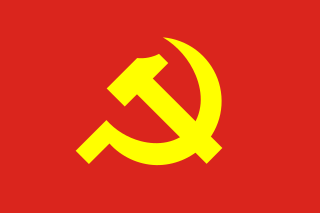
The Politburo of the Communist Party of Vietnam (CPV), formally the Political Bureau of the Central Committee of the Communist Party of Vietnam (Vietnamese: Bộ Chính trị Ban Chấp hành trung ương Đảng Cộng sản Việt Nam Khoá), is the highest body of the CPV in between gatherings of the National Congress and of the plenary sessions Central Committee. According to Party rules, the Politburo directs the general orientation of the government.
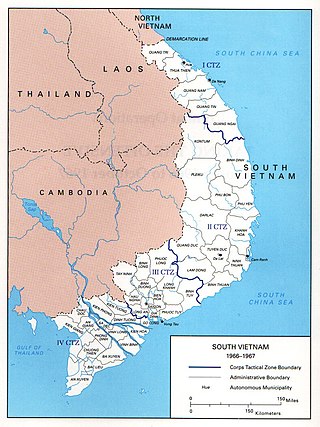
In 1958, the upswing in violence against the government of South Vietnam continued, much of which was committed by the communist-dominated insurgents now called the Viet Cong. In South Vietnam, President Ngo Dinh Diem appeared to be firmly in power, although many American officials expressed concern about the repressive nature of his regime. The United States continued to finance most of the budget of the government of South Vietnam. North Vietnam continued to campaign for reunification with the South while focusing on its internal economic development, but pressure from hard-pressed communists in the South was forcing the North to contemplate a more active military role in overthrowing the Diem government.
After World War II and the collapse of Vietnam's monarchy, France attempted to re-establish its colonial rule but was ultimately defeated in the First Indo-China War. The Geneva Accords in 1954 partitioned the country temporarily in two with a promise of democratic elections in 1956 to reunite the country. However, the United States and South Vietnam insisted on United Nations supervision of any election to prevent fraud, which the Soviet Union and North Vietnam refused. North and South Vietnam therefore remained divided until The Vietnam War ended with the Fall of Saigon in 1975.

This article describes the history of the Communist Party of Vietnam (CPV) from its origins in the 1920s through to the consolidation of its position as the ruling party of a united Socialist Republic Vietnam after 1976.

The 5th National Congress of the Communist Party of Vietnam was held in Ba Đình Hall, Hanoi from 27–31 March 1982. The congress occurs once every five years. A total of 1,033 delegates represented the party's 1.727 million card-carrying members.
Ho Chi Minh Thought is a political philosophy that builds upon Marxism–Leninism and the ideology of Vietnamese revolutionary Ho Chi Minh. It was developed and codified by the Communist Party of Vietnam and formalised in 1991. The term is used to cover political theories and policies considered as representing a form of Marxism–Leninism that has been adapted to Vietnamese circumstances and history. The ideology includes views on the basic issues of the Vietnamese Revolution, specifically the development and application of Marxism–Leninism to the material conditions of Vietnam.

Nguyễn Chí Thanh was a General in the North Vietnamese Vietnam People's Army and former North Vietnamese politician. Nguyễn Chí Thanh was born in Thừa Thiên Province in Central Vietnam to a peasant family. His original name was Nguyễn Văn Vịnh. He joined the Indochinese Communist Party in the mid-1930s and apparently spent most of the Second World War in a French prison. He worked for the Party in Central Vietnam until his rise to the Politburo in 1951. During the First Indochina War Thanh was made a general of the People's Army of Vietnam. From 1965 until his death he served as the leading strategist and military commander of COSVN, the southern headquarters of communist military and political operations within the Republic of Vietnam. In 1967, he presented plans for what was to become the Tet Offensive to the Politburo, but died shortly after receiving permission to implement his plan.
Socialism in Vietnam, in particular Marxism–Leninism, is the ideological foundation of the Communist Party of Vietnam (CPV) for the development of the country ever since its establishment.

Renewal in Viet Nam: Theory and Reality is a political book written in 2015 by Vietnamese Communist Party general secretary Nguyễn Phú Trọng. The text is a summary of past experiences and defines the tasks and objectives of the Vietnamese revolution and the Communist Party of Vietnam. The text consists of a selection of speeches and ideological documents by Trọng, and it is his main ideological contribution to the party's ideology Ho Chi Minh Thought. The text has been compared to Chinese Communist Party general secretary Xi Jinping's political book The Governance of China.














